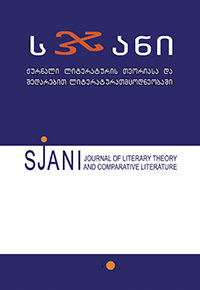აკაკის "გამზრდელი" და განმანათლებლობის პარადიგმა (ქართულად; ინგლისური
Gamzrdeli by Akaki Tsereteli and the Paradigm of Enlightenmemt
Author(s): Teimuraz DoiashniliSubject(s): Poetry, Studies of Literature, 19th Century
Published by: ლიტერატურის ინსტიტუტის გამომცემლობა
Keywords: Gamzrdeli; Akaki Tsereteli; Enlightenment;
Summary/Abstract: Gamzrdeli by Akaki Tsereteli is considered to be one of the conclusive creations of the 19th century of the Georgia realism. However, we believe the cultural-speculative context in which the masterpiece of the national poetry should be studied is still elusive. In Gamzrdeli, which according to the author depicts the true story, both the fabula and the characters are not ordinary. One of them (Batu) has been isolated from the modern world and stays in the pristine nature. Another character (a guest called Safar-Beg), who was brought up by the same governess as the anchoret was raised by, abuses the wife of the very host, who had left his home in order to help Safar-Beg. The humiliated husband lets his guest leave his home alive and refuses to take revenge against him. More paradoxical is the end of the poem: instead of the guilty person, the innocent governess commits a suicide. What is more, the author comes up with the verdict that acquits the guilty personage: “Only bringing-up cannot do anything If the person does not help.” If the “upbringing” is helpless without “personality”, why the wise governess kills himself then?! Our paper searches for such a viewpoint that naturally determines the peculiarities of the poem in the frame of artistic logic. In order to reveal the cultural code of Gamzrdeli, the first chapter is of a central importance which is entirely dedicated to the description of one of the lead character Batu. The detailed analyses of this chapter reveal that there are realized the enlightening opposition of “hard” (civilized) and “simple” (natural) lives in the poem. In a word, Batu’s narrative is the artistic realization of the Rousseauistic concept of “origin” _ returning to the pristine environment and people. The existence of enlightening reflection in Gamzrdeli points that not only is there a linear narration of “the true story” in the text but it also represents philosophical parabola in terms of a genre. The poem topologically is close to the enlightening philosophical prose (Walter, Diderot), where the ideological-ethical problems of the epoch are “wrapped”. Moreover, in the specially organized compositional space of the text idea-personages act instead of characters meaning that their behavior is not lead by psychological motivations but the logic of conception. Aristocratic Safar-Beg represents the civilized lifestyle in the poem. In Gamzrdeli the conflict between sensible positive character and the negative personage acting through his passion is presented, which is the main collection of the enlightening type of a novel. Why does Batu send Safar-Beg to Haji-Usup? Batu did not kill his foster-sibling as he chooses to defend the tradition. And yet, is it possible to remain unpunished who neglected the custom “former than religion” and destroyed the fundamental norm of the existence of the society?! In Gamzrdeli Batu’s personal tragedy gradually turns into the crisis of the society leading us to the wide-scale dimension. This is only Haji-Usup who can give a verdict and, actually, he has to do this as an educator of Safar-Beg and wise leader of the people. The response to the nonhuman behavior of him is a suicide, which is the most extreme form of despair – the catastrophe of a person. Therefore, it requires understanding vert accurately: what brought a wise educator to the tragic decision? According to the the poem this is not and cannot be the display of an affect. The author specially prepares the act of suicide with a small but a very significant thematic maneuver, which increases the level of the unexpectedness of the personage’s behavior. After the educator heard everything from Safar-Beg, he started talking about the death in order to clear up conscience. Logically, only the shot of this gun is left to destroy a real criminal. Safar-Beg is ready too for this and the reader too with him, but… But before the suicide of the educator Safar-Beg is already punished by ashamed life (“You do not deserve even death!). Therefore the words “and in order to clear up the consciousness I will die” refers not Safar-Beg, but the educator himself. These words are moral self-evaluation and the recognition of his direct responsibility for the crime. That’s why Haji Usup’s suicide has nothing to do with the sacrifice done for the sinner either with the model of sacrifice for God, as this is misinterpreted by some researchers… Thus, the final formation of the essence of the poem is connected with the suicide of the educator. The wise educator who is the confessor of people and moral legislator as well, in conceptual terms represents the image of a wise man formed through the parameters of enlightenment, always thoughtful as a symbol of enlightenment. In the crime committed by his pupil, which in Haji-Usup’s opinion surpasses personal level and weakens the basis of the society, not only does he see the failure of his pedagogical method which was based on almighty idea of upbringing, but he also sees the end of the beginning of educative rationalistic ethics and traditional society, left alone in front of irrational instincts. The suicide of Gamzrdeli is the catastrophe of the ideological system, which shows Akaki Tsereteli’s, as an adept of enlightenment, the metamorphosis from educative optimism to scepsis and pessimism.
Journal: სჯანი
- Issue Year: 2017
- Issue No: 18
- Page Range: 7-24
- Page Count: 18
- Language: Georgian

